Unit 2 Robots Learning about language动词不定式课件(31张)
文档属性
| 名称 | Unit 2 Robots Learning about language动词不定式课件(31张) | 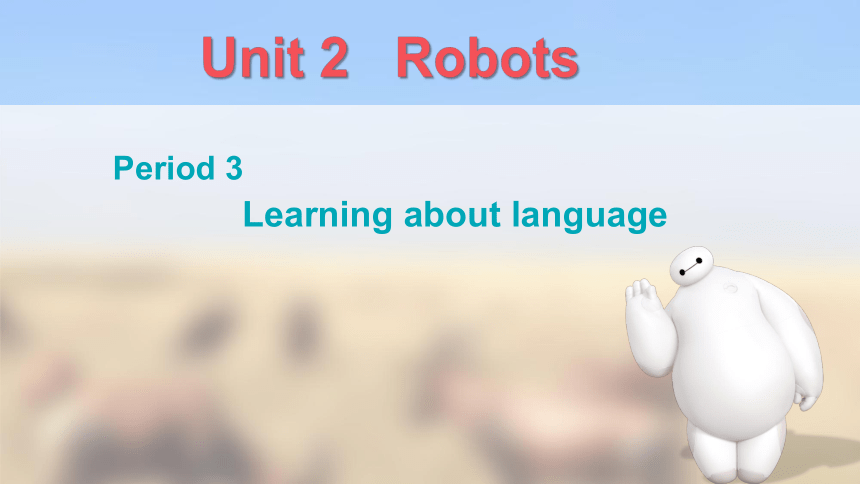 | |
| 格式 | zip | ||
| 文件大小 | 4.1MB | ||
| 资源类型 | 教案 | ||
| 版本资源 | 人教版(新课程标准) | ||
| 科目 | 英语 | ||
| 更新时间 | 2019-04-16 18:14:18 | ||
图片预览


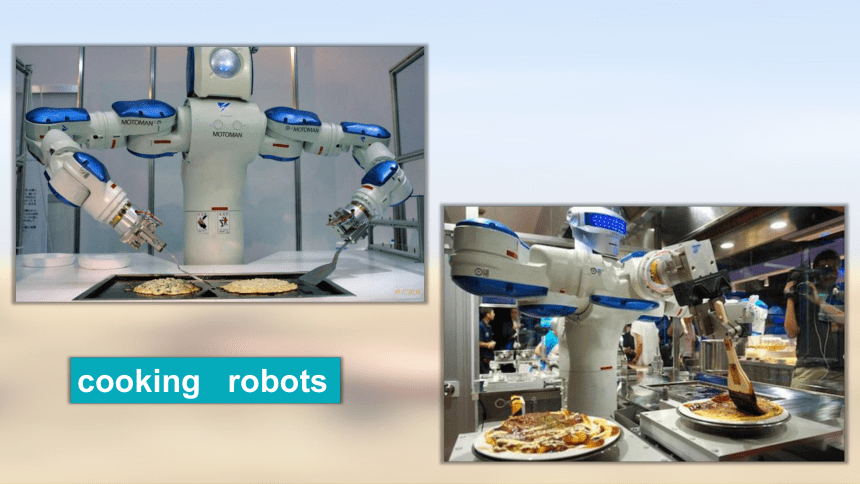
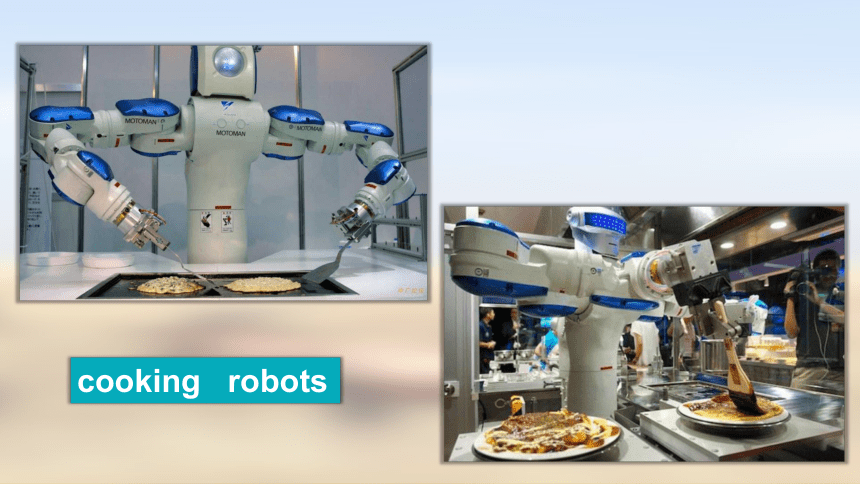
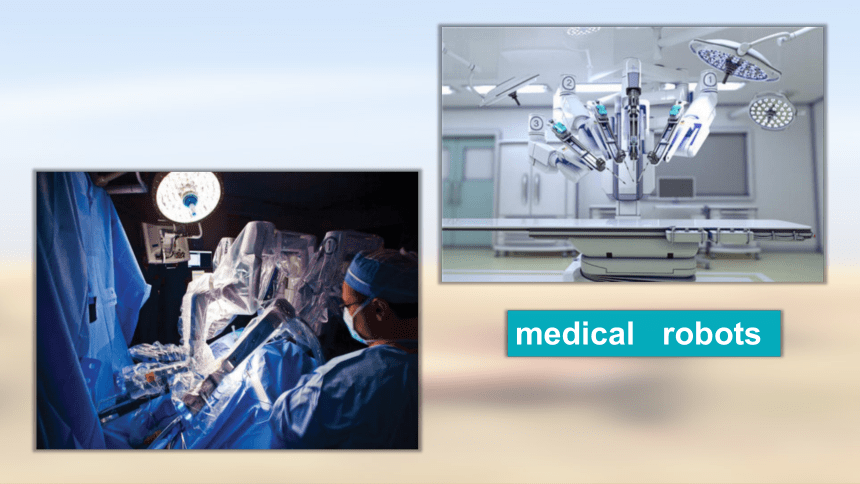

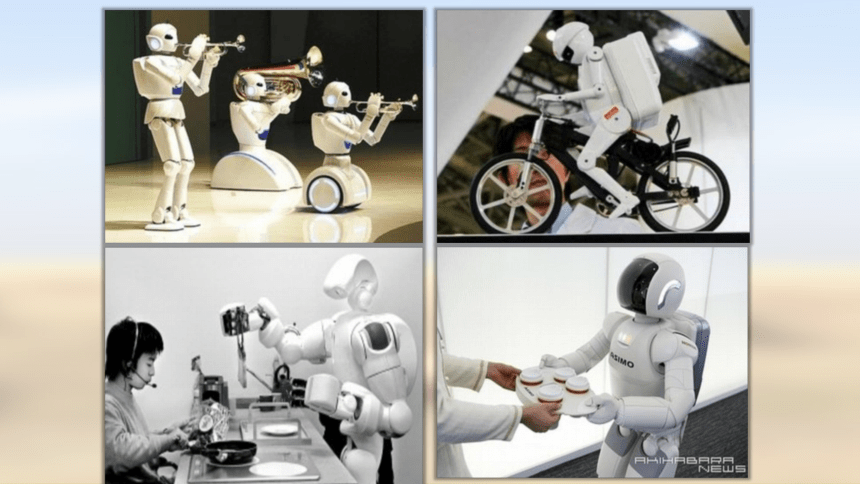

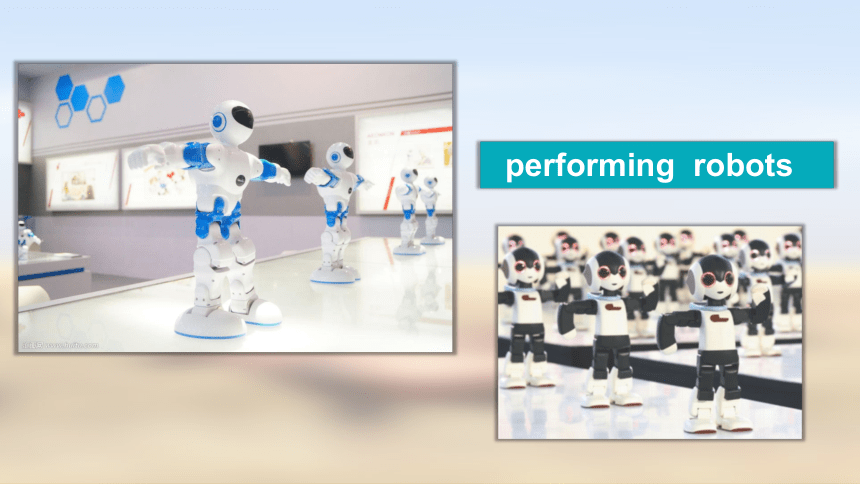

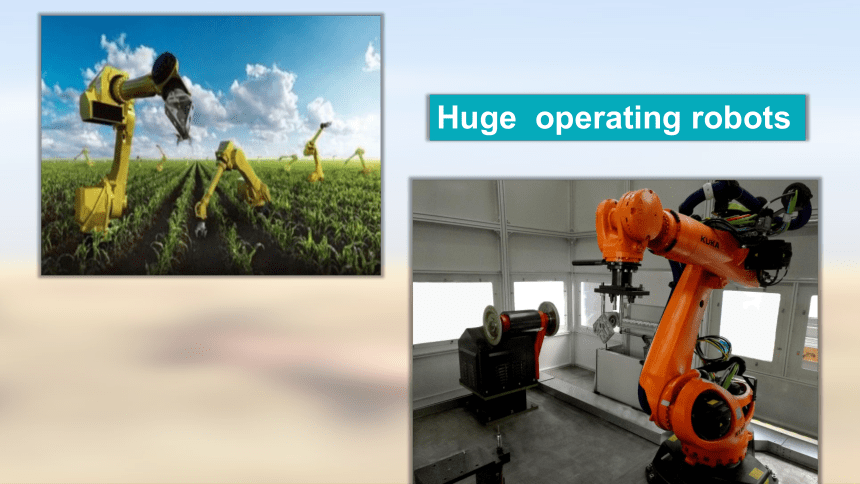

文档简介
Unit 2 Robots
Period 3
Learning about language
教学目标:复习动词不定式以及动词不定式的被动式,能够了解动词不定式的含义。
教学重难点:能够使用动词不定式及动词不定式的被动式造句,并且能正确运用及恰当的去表达。
Unit 2 Robots
cooking robots
cooking robots
medical robots
service robots
cleaning robots
performing robots
Household robots
Huge operating robots
All these robots have something in common----
Artificial Intelligence
Revise useful structures
Passive infinitive
动词不定式的主动被动结构变化
一般式 进行式 完成式
主 动 to do to be doing to have done
被 动
to be done
to have been done
1. It’s an honour to be invited to the ceremony.
2. She didn’t like to be treated as a child.
3. His dream was to be admitted to a good university.
4. There are a lot of things to be discussed.
5. She was sent there to be trained for the space flight.
作主语
作宾语
作表语
作定语
作状语
不定式的被动式在句中作什么成分
Revising useful structures
Ex. 2 (page 14)
Complete each of the following sentences using the passive infinitive of a suitable verb or phrase below.
1 The company’s new car is going ______________ in the coming months.
2 Since Claire had become attached to Tony, the robot needed ___________.
to be designed
to be rebuilt
3 Tim refused _________________ by his father when he went for a haircut.
4 The desire ______________ a great writer inspires many young authors.
5 He felt it was absurd ______________ hatred for someone he had never met.
to be accompanied
to be known as
to be filled with
Revising useful structures
Ex. 2 (page 14)
注意:
感官动词和一些使役动词的不定式的主动形式要省去to,但在变成被动语态后需要加上to。能这样用的动词有:make, have, let, see, hear, notice, listen to, watch等。如:z x x k
We often see him act like that.
= He is often seen to act like that.
我们常常看到他这样做。
2) 在can’t help but, have nothing to do but结构中,介词but后的不定式省去to。如:
I can’t help (but) suspect his motive.
我不禁怀疑起他的动机。
不定式有时要用主动形式表示被动意义
不定式的逻辑主语和逻辑宾语都出现在不定式前面,只能用主动形式;若在句中找不到不定式的逻辑主语,则用不定的被动形式。如:
Do you have anything to wash today?
(to wash的主语为句子的主语you,其逻辑宾语为anything。)
你今天要洗什么吗?
Do you have anything to be washed?
(to be washed不是you做,而是由“我”或其他人来做)
你有什么要其他人洗的吗?
在There be/ seem…+主语+to do表示存在的句型中的不定式,一般用主动形式表示被动意义(也就是说,我们可能会见到被动形式,但主动形式要好得多)。
There’s not enough food to eat. (The food is eaten.)
没有足够的食物吃。
There’s no chair to sit on. (The chair is sat on.)
没有椅子坐。
但在下列句子中,只能用主动形式。如:
There’s not enough food for us to eat.
我们没有足够的食物吃。
3. 在形容词以及含有形容词的名词后的不定式,一般用主动形式表示被动意义,其中形容词常见的有easy, difficult, important, impossible等。如:
The work is impossible to finish in two days. (The work is finished.)
工作不可能两天之内完成。
English is not so easy to learn. (English is learnt.) 英语并不好学。
在一些固定用法,如“挨骂,受责备,受批评” 用be to blame;“(东西等)出租”用to let。如:
He is to blame for what he has done.
他应为他所做的受责备。
The house is to let.
房子要出租。
假如不定式所表示的动词,在谓语所表示的动词(或状态)之前发生,该不定式要用完成式。如:
I’m glad to have seen your mother.
=I’m glad that I have seen your mother.
很高兴见过你母亲。
1.He _______________ (经常被听到唱) English songs.
2.He is said ( 已写 ) a new novel.
3.I'm going to Beijing next week.Do you have anything
_______________( 带给) your parents?
4.People wish the murderer _________________ (被处死).
5.The books are not allowed ________________ (带出) the room.
6.The chair looks rather hard, but in fact, it is____________ (坐着很舒服)
is often heard to sing
to be taken to
to be put to death
to be taken out of
comfortable to sit on
二、完成句子
to have written
Answer these questions using words or phrases from the text and try to use passive infinitive properly
1.Will robots replace us to learn in future?
2.Will robots replace treachers to work in future?
Discuss in your group
Man is always stronger than robots,we can not be replaced!
Go over key words and expressions.
Go over the grammar.
Do ex. 3 on Page 14.
Assignment
THANKS
See you next time
Period 3
Learning about language
教学目标:复习动词不定式以及动词不定式的被动式,能够了解动词不定式的含义。
教学重难点:能够使用动词不定式及动词不定式的被动式造句,并且能正确运用及恰当的去表达。
Unit 2 Robots
cooking robots
cooking robots
medical robots
service robots
cleaning robots
performing robots
Household robots
Huge operating robots
All these robots have something in common----
Artificial Intelligence
Revise useful structures
Passive infinitive
动词不定式的主动被动结构变化
一般式 进行式 完成式
主 动 to do to be doing to have done
被 动
to be done
to have been done
1. It’s an honour to be invited to the ceremony.
2. She didn’t like to be treated as a child.
3. His dream was to be admitted to a good university.
4. There are a lot of things to be discussed.
5. She was sent there to be trained for the space flight.
作主语
作宾语
作表语
作定语
作状语
不定式的被动式在句中作什么成分
Revising useful structures
Ex. 2 (page 14)
Complete each of the following sentences using the passive infinitive of a suitable verb or phrase below.
1 The company’s new car is going ______________ in the coming months.
2 Since Claire had become attached to Tony, the robot needed ___________.
to be designed
to be rebuilt
3 Tim refused _________________ by his father when he went for a haircut.
4 The desire ______________ a great writer inspires many young authors.
5 He felt it was absurd ______________ hatred for someone he had never met.
to be accompanied
to be known as
to be filled with
Revising useful structures
Ex. 2 (page 14)
注意:
感官动词和一些使役动词的不定式的主动形式要省去to,但在变成被动语态后需要加上to。能这样用的动词有:make, have, let, see, hear, notice, listen to, watch等。如:z x x k
We often see him act like that.
= He is often seen to act like that.
我们常常看到他这样做。
2) 在can’t help but, have nothing to do but结构中,介词but后的不定式省去to。如:
I can’t help (but) suspect his motive.
我不禁怀疑起他的动机。
不定式有时要用主动形式表示被动意义
不定式的逻辑主语和逻辑宾语都出现在不定式前面,只能用主动形式;若在句中找不到不定式的逻辑主语,则用不定的被动形式。如:
Do you have anything to wash today?
(to wash的主语为句子的主语you,其逻辑宾语为anything。)
你今天要洗什么吗?
Do you have anything to be washed?
(to be washed不是you做,而是由“我”或其他人来做)
你有什么要其他人洗的吗?
在There be/ seem…+主语+to do表示存在的句型中的不定式,一般用主动形式表示被动意义(也就是说,我们可能会见到被动形式,但主动形式要好得多)。
There’s not enough food to eat. (The food is eaten.)
没有足够的食物吃。
There’s no chair to sit on. (The chair is sat on.)
没有椅子坐。
但在下列句子中,只能用主动形式。如:
There’s not enough food for us to eat.
我们没有足够的食物吃。
3. 在形容词以及含有形容词的名词后的不定式,一般用主动形式表示被动意义,其中形容词常见的有easy, difficult, important, impossible等。如:
The work is impossible to finish in two days. (The work is finished.)
工作不可能两天之内完成。
English is not so easy to learn. (English is learnt.) 英语并不好学。
在一些固定用法,如“挨骂,受责备,受批评” 用be to blame;“(东西等)出租”用to let。如:
He is to blame for what he has done.
他应为他所做的受责备。
The house is to let.
房子要出租。
假如不定式所表示的动词,在谓语所表示的动词(或状态)之前发生,该不定式要用完成式。如:
I’m glad to have seen your mother.
=I’m glad that I have seen your mother.
很高兴见过你母亲。
1.He _______________ (经常被听到唱) English songs.
2.He is said ( 已写 ) a new novel.
3.I'm going to Beijing next week.Do you have anything
_______________( 带给) your parents?
4.People wish the murderer _________________ (被处死).
5.The books are not allowed ________________ (带出) the room.
6.The chair looks rather hard, but in fact, it is____________ (坐着很舒服)
is often heard to sing
to be taken to
to be put to death
to be taken out of
comfortable to sit on
二、完成句子
to have written
Answer these questions using words or phrases from the text and try to use passive infinitive properly
1.Will robots replace us to learn in future?
2.Will robots replace treachers to work in future?
Discuss in your group
Man is always stronger than robots,we can not be replaced!
Go over key words and expressions.
Go over the grammar.
Do ex. 3 on Page 14.
Assignment
THANKS
See you next time
